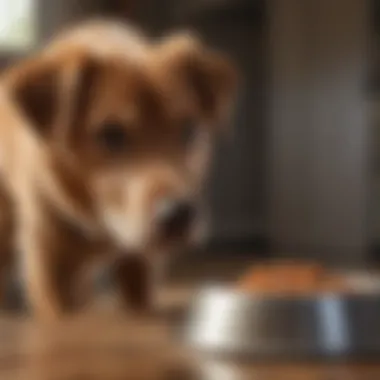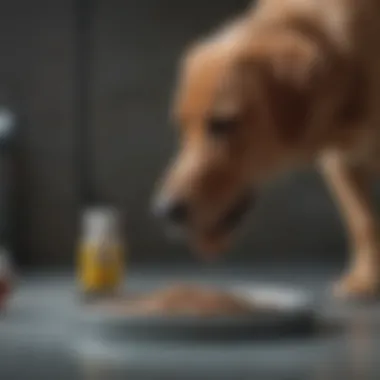Essential Feeding Strategies for Dogs with Diarrhea


Intro
When it comes to addressing the dietary needs of dogs suffering from diarrhea, understanding specific pet characteristics is essential. Owners often face confusion over what to feed their pets and how to help them recover swiftly. This article aims to clarify these concerns, providing insights into the underlying causes of diarrhea and the fundamental adjustments to a dog's feeding routine. The aim is to create a reliable resource for pet owners that emphasizes informed decisions during such distressing times.
Understanding Your Pet
Every dog is unique, and various factors can influence their response to dietary changes. To make informed decisions, it's crucial to appreciate each pet's individuality.
Breed Traits
Dog breeds possess specific traits that can affect their digestion and dietary preferences. For instance, smaller breeds might experience digestive issues more frequently than larger ones. Understanding these traits can help owners choose appropriate food options.
Common Temperaments
Temperament plays a significant role in a dog's behavior and health. Some dogs may be more prone to stress, which can exacerbate gastrointestinal issues. Recognizing your dog's temperament allows for tailored care, ensuring a more conducive environment for recovery.
Special Needs
Dogs with pre-existing health conditions may have special dietary requirements. Consult a veterinarian to understand any specific nutritional guidelines that might apply in such cases. Tailoring the diet not only aids in recovery but also promotes long-term health.
Pet Care Essentials
Care routines must adjust when a pet is unwell, especially during digestive distress. Following guidelines ensures effective monitoring of their health and recovery process.
Nutrition and Feeding Guidelines
Nutrition plays a pivotal role in managing diarrhea. A bland diet is often recommended initially. Options include boiled chicken and rice, which are gentle on the stomach. Gradually reintroducing regular food can help gauge the pet's tolerance.
Grooming Tips and Techniques
While illness tends to focus on dietary adjustments, grooming can still be relevant. Keeping a dog clean can prevent infections and stress during recovery. Regular brushing and gentle baths can also be beneficial.
Health and Wellness
Monitoring overall health is vital. Observe for signs of dehydration, lethargy, or ongoing symptoms. These can signal the need for a veterinary consultation, ensuring appropriate actions are taken.
Important: Always consult with a veterinarian before making significant changes to your dog's diet, especially during health crises.
Training and Behavior
Recovery extends beyond feeding; it involves the dog's overall well-being and behavior management as well.
Basic Training Techniques
Implementing basic commands can help maintain normalcy in routines, aiding in emotional support during recovery. Simple commands like
Understanding Diarrhea in Dogs
Diarrhea in dogs is a common clinical sign that can arise from various underlying issues. Understanding the nature and causes of diarrhea helps pet owners make informed decisions about their dog's diet and overall health. Knowing what leads to diarrhea is crucial. This knowledge can influence the suitability of certain foods, choices of feeding methods, and the timing of veterinary consultations. A well-informed pet owner can significantly contribute to their dog's recovery process.
Definition and Symptoms
Diarrhea is typically defined as loose or watery stools occurring more frequently than usual. It can range from mild to severe, and it may be either acute or chronic. Acute diarrhea develops suddenly and lasts for a short duration, while chronic diarrhea persists for a longer timeframe. Symptoms may include increased urgency to eliminate, signs of discomfort, or weight loss if the condition continues.
Common Causes of Diarrhea
Understanding the common causes of diarrhea aids in addressing the issue effectively. This section outlines several contributors to this condition.
Dietary indiscretion
Dietary indiscretion refers to the consumption of inappropriate or sudden changes in food such as spoiled food, trash, or even table scraps. It is a leading cause of acute diarrhea in dogs. When dogs consume something that does not agree with their digestive system, it can lead to gastrointestinal upset. This characteristic makes it a prevalent cause of diarrhea. However, while recognizing this factor is crucial, the downside is that it can be preventable through proper dietary management.
Parasites


Parasites like Giardia and roundworms frequently contribute to diarrhea. Contagious in nature, these organisms can disrupt normal digestion. The key aspect of parasites is their ability to not only evade the dog's immune system but also cause significant gastrointestinal distress. Their impact can lead to notable weight loss and potential dehydration, which makes understanding and addressing these risks a priority for pet owners.
Bacterial infections
Bacterial infections can also result in diarrhea as harmful bacteria invade a dog's intestines, causing inflammation and other gastrointestinal issues. Salmonella and E. coli are among the culprits that may contaminate food or come from infected sources. The key factor here is the ability of these bacteria to thrive under specific conditions, which may arise from environmental exposure or dietary choices. Their treatment generally requires veterinary intervention to restore the dog's health.
Viral infections
Viruses such as parvovirus can lead to severe diarrhea, particularly in young or unvaccinated dogs. Viral infections are characterized by rapid onset and are often accompanied by other symptoms like vomiting and lethargy. They pose significant health risks. The unique feature of viral infections is their contagion potential. Awareness of vaccination statuses is essential to mitigating the risks associated with these infections.
Underlying health conditions
Underlying health issues can also manifest as diarrhea. Conditions such as pancreatitis, inflammatory bowel disease, or even tumors can result in gastrointestinal disturbances. Recognizing this as a potential cause is vital because it may not be immediately apparent. The key characteristic of underlying health conditions is their complexity; they can require specialized diagnostics and treatment plans that go beyond simple dietary adjustments.
Immediate Actions for Pet Owners
When dogs experience diarrhea, pet owners must act promptly to assess the situation. This section emphasizes the importance of understanding the severity of the condition before taking further steps. Recognizing symptoms and knowing when to seek veterinary care can make a significant difference in a dog's recovery.
Assessing the Severity
Frequency and consistency
The frequency and consistency of a dog's diarrhea are critical indicators of the potential severity of the condition. Owners should take note of how often the dog has diarrhea and whether the stool is watery, semi-formed, or solid. Frequent, watery stools can lead to dehydration, a serious issue that requires attention. Conversely, less frequent but still loose stools may not demand immediate intervention.
Regular monitoring of these factors helps in understanding the overall health of the dog. The main benefit of evaluating frequency and consistency is that it enables pet owners to gauge if the dog's condition is improving or worsening. Therefore, taking careful note of these characteristics is beneficial as it helps define the appropriate action to take next.
Presence of blood or mucus
While assessing a dog's diarrhea, the presence of blood or mucus can be a telling sign of underlying issues. Blood in the stool may indicate infections or intestinal damage, while mucus can point toward digestive disturbances. Both signs warrant immediate attention, as they may suggest the need for medical intervention.
Recognizing blood or mucus is crucial because it may indicate severe digestive issues that require rapid response. The unique feature of this assessment is its role in differentiating between minor and more serious health concerns. Promptly identifying these signs can lead to faster treatment, ultimately improving the dog's recovery chances.
Accompanying symptoms (vomiting, lethargy)
Accompanying symptoms such as vomiting or lethargy can signal a more severe condition associated with diarrhea. Vomiting introduces additional complications, making dehydration a greater risk. Lethargy can indicate that the dog is not feeling well and needs urgent care. These symptoms, when present, suggest that the dog’s well-being requires careful consideration.
It is important for pet owners to be proactive in observing these symptoms. Their key characteristic is that they can amplify the necessity for veterinary consultation. Recognizing these signs contributes to a more comprehensive understanding of the dog's health condition, allowing for informed decisions moving forward.
Consulting a Veterinarian
When to seek professional advice
Knowing when to consult a veterinarian is crucial for dog owners facing diarrhea-related concerns. It is important to seek advice if diarrhea persists longer than 24 hours, is accompanied by blood, or if the dog shows significant discomfort. These signs indicate that the situation could escalate and the dog requires professional evaluation.
This aspect is essential as early intervention often dictates the treatment's effectiveness. It becomes a beneficial choice because prompt veterinary care can prevent further complications. Understanding these indicators empowers pet owners to take swift actions to safeguard their dog's health.
What information to provide
When reaching out to a veterinarian, the information provided can significantly influence the diagnosis and treatment. Pet owners should share details about the dog's diet, any recent changes in food, and the timeline of diarrhea episodes, including frequency and consistency. Any accompanying symptoms, such as vomiting or lethargy, should also be discussed.
This information is vital for helping the veterinarian form a complete picture of the situation. The unique feature here is its capacity to allow the veterinarian to make more informed decisions regarding treatment options. A well-prepared pet owner contributes to a faster, more accurate diagnosis, ultimately benefiting the dog's recovery journey.
To Feed or Not to Feed
Feeding a dog experiencing diarrhea is a complex decision. Many pet owners are unsure whether to withhold food or to continue feeding. This section aims to clarify this important aspect. It focuses on the role of fasting, the introduction of food, and the benefits and drawbacks associated with different feeding strategies during diarrhea recovery.
Understanding Fasting
Duration of fasting periods
Fasting is considered a common practice when a dog has diarrhea. The typical duration for fasting can range from 12 to 24 hours. This restraint allows the gastrointestinal system to rest. It can help in reducing irritation. Allowing some time without food can enable any inflammation to subside, providing relief for the digestive organs. Some owners may find comfort in knowing that short fasts can often lead to improved conditions. However, it's critical to monitor for other symptoms during this time to ensure that the dog's health does not worsen.
Benefits of short fasting
Short periods of fasting offer various benefits. One key advantage includes stabilizing the stomach while clearing out toxins. Dogs can start to feel more comfortable without the burden of digestion during this period. Another essential aspect is that fasting can motivate the dog to be more interested in food once it is reintroduced. This in turn can enforce a more positive feeding experience after recovery from diarrhea. But it's essential to note that prolonged fasting can lead to further stress or nutritional deficiencies, especially in puppies or older dogs.


Feeding During Diarrhea
Pros and cons
Feeding during diarrhea presents both pros and cons. On one side, certain foods can provide necessary nutrients and comfort to the dog. Foods like boiled chicken and rice are gentle on the stomach and can help ease the transition back to normal eating patterns. Conversely, providing food too early can lead to ongoing gastrointestinal upset. This can worsen the diarrhea, making recovery prolonged. Understanding the balance is key. The choice to feed or not should depend on the overall status of the dog and any other underlying symptoms.
Individual factors to consider
Every dog's health status is unique. Factors such as age, breed, and pre-existing conditions must be considered when making feeding decisions. For instance, puppies and elderly dogs might need special attention compared to adult dogs. Monitoring the dog's reaction to food is critical. If the dog continues to exhibit signs of distress after being fed, it may be wise to revert to fasting or choose a different food option. It’s also useful to consult a vet to tailor feeding approaches for individual needs in these situations.
Recommended Diet for Dogs with Diarrhea
When a dog is dealing with diarrhea, diet becomes a focal point. Proper nutrition is essential for recovery and ongoing health. The right diet can help stabilize a dog’s digestive system and provide necessary nutrients without exacerbating the condition. Choosing the right food can also alleviate discomfort and promote a quicker return to normal bowel function. Understanding dietary options during this time is vital for pet owners who seek to aid their furry companions.
Bland Diet Suggestions
Boiled chicken and rice
Boiled chicken and rice is often the first recommendation for dogs experiencing diarrhea. This combination is easy to digest and gentle on the stomach. The key characteristic of this dish is its low-fat content, which helps reduce the workload of the digestive system. Its simplicity makes it widely accepted by dogs, even those with sensitive stomachs.
The unique feature of boiled chicken and rice is how it provides a balance of protein and carbohydrates while minimizing spices or additives that could worsen diarrhea. It offers advantages such as ease of preparation and palatability. However, it lacks comprehensive nutrition, which is something to consider for prolonged feeding.
Canned pumpkin
Canned pumpkin is another beneficial option for dogs with diarrhea. Its high fiber content plays a crucial role in firming up loose stools. The key characteristic of canned pumpkin is its ability to absorb excess water in the intestines. It can soothe the digestive tract and provide a source of nutrients.
Canned pumpkin's unique feature is its natural consistency, making it easy to mix with other foods. It serves advantages like being relatively inexpensive and readily available at most grocery stores. One disadvantage is to ensure that only pure pumpkin, without added sugars or spices, is used to avoid further digestive upset.
Sweet potatoes
Sweet potatoes offer a nutritious alternative for dogs recovering from diarrhea. They are rich in vitamins and minerals, contributing positively to digestive health. The key characteristic of sweet potatoes is their high fiber content, which also aids in firming up stools. Their natural sweetness makes them appealing to many dogs, encouraging appetite.
The unique aspect of sweet potatoes is their versatility. They can be boiled, baked, or mashed, making them easy to prepare. Advantages include their high nutritional value and fiber. However, they should be introduced gradually, as excessive fiber can lead to bloating or gas in some dogs.
Commercial Options
Prescription diets
Prescription diets are specially formulated to address gastrointestinal issues in dogs. These diets often provide easily digestible ingredients and balanced nutrition tailored to recovery. The key characteristic of prescription diets is that they are created based on scientific research to support digestive health. They are a beneficial choice for dogs with severe or recurring diarrhea.
A unique feature of these diets is that they are typically available only through veterinary clinics or authorized retailers, ensuring that they meet specific health needs. Their main advantage is the assurance of quality and safety according to veterinary standards. Disadvantages may include higher costs compared to regular dog food and the need for a veterinarian's approval.
Gentle dry food formulations
Gentle dry food formulations provide a convenient option for maintaining a dog’s diet while still accommodating gastrointestinal sensitivities. This type of food is generally marked by its mild ingredients and lower fat content, aimed at easing digestion. The key characteristic is that these foods typically avoid common allergens and irritants. They are a popular choice for pet owners seeking a long-term feeding solution during periods of recovery.
The unique feature of these formulations is their focus on maintaining nutritional content while being easily digestible. Advantages include easy storage and serving, plus the ability to promote dental health through chewing. However, they may not offer the same level of hydration that wet foods provide, which is a consideration for dogs that need extra fluids during recovery.
The dietary choices you make for a dog with diarrhea can significantly impact their recovery and overall health. It's crucial to evaluate the provided options and make informed decisions.
Hydration and Electrolyte Balance
The state of hydration and maintaining electrolyte balance is crucial for dogs experiencing diarrhea. When a dog has diarrhea, they are at a greater risk to lose valuable fluids and electrolytes, which can lead to dehydration. Dehydration can result in a multitude of health problems and can even be deadly if not addressed promptly. Thus, understanding how to manage hydration is essential for any pet owner dealing with this issue.
Importance of Hydration
Hydration is fundamental for a dog's general health and well-being. Water serves many functions in the body, including:
- Regulating body temperature: Proper hydration helps maintain thermal balance.
- Supporting digestion: Water aids in the digestive processes and helps the intestines function effectively.
- Transporting nutrients: Fluids transport essential nutrients throughout the body.
In the context of diarrhea, a dog can lose a significant amount of water quickly. Pet owners should be alert to signs of dehydration, such as dry gums, sunken eyes, and excessive lethargy. Keeping an eye on water intake is vital. Encouraging a dog to drink small amounts frequently is often more effective than offering large quantities at once.
Oral Rehydration Solutions
While water is essential, sometimes a simple increase in water intake may not suffice during diarrhea. Oral rehydration solutions (ORS) are designed to restore electrolytes lost during dehydration. These solutions typically contain a mix of water, salts, and sugars in balanced proportions.


Commercially available rehydration solutions can offer benefits, as they are formulated specifically for animals. It is important to choose a dog-safe product, like the ones specifically designed for pets. Alternatively, homemade solutions can also be an option. A simple mix could be made from:
- 1 liter of clean water
- 1 teaspoon of salt
- 1 tablespoon of sugar
This mixture can help restore electrolyte balance temporarily. Encourage your dog to drink this solution little by little. Always consult your veterinarian before introducing rehydration formulas to ensure they suit your dog's needs and condition.
Remember: If a dog shows severe signs of dehydration, immediate veterinary attention is necessary.
Monitoring and ensuring proper hydration must be part of the overall approach to managing a dog's health during episodes of diarrhea. Taking proactive measures can significantly impact a dog's recovery and general well-being.
Monitoring Recovery
Monitoring recovery from diarrhea in dogs is essential for ensuring their digestive health returns to normal. The recovery process requires attentive observation to determine when to adjust feeding practices effectively. Pet owners benefit by understanding the stages of recovery and recognizing signs that indicate improvement. This knowledge can directly impact the speed of recovery and overall well-being of the pet.
Recognizing Improvements
Recognizing improvements is a fundamental aspect of the monitoring process. A dog recovering from diarrhea typically shows changes in behavior and physical condition over time. These changes can include:
- Increased Energy: A once lethargic dog may start to exhibit lively behavior, indicating a return to normal energy levels.
- Normalizing Bowel Movements: Observing the consistency and frequency of bowel movements is key. As the dog's stools become firmer, this is a strong indicator of recovery.
- Interest in Food: A renewed interest in food often means that the gastrointestinal system is starting to function properly again.
These signs are crucial for pet owners looking to gauge their dog's recovery effectively. Monitoring these changes can help decide when it is appropriate to reintroduce a regular diet.
When to Reintroduce Regular Diet
Deciding when to reintroduce a regular diet is a pivotal step in the recovery process. This decision should be made based on the dog's overall condition and the progress observed during the monitoring phase.
Gradual Reintroduction Guidelines
Gradual reintroduction guidelines assist pet owners in safely transitioning their dogs back to regular food. This strategy involves slowly incorporating small amounts of the regular diet into the bland diet previously used. The key characteristic of this approach is measured moderation, where it’s important to keep portions small to minimize the risk of re-triggering diarrhea.
Benefits of this gradual reintegration include:
- Reduced Risk of Gastrointestinal Upset: A sudden change in diet can often lead to further digestive problems. Gradual reintroduction allows the gut to adjust effectively.
- Observation of Reaction: By adding food slowly, owners can observe any adverse reactions and adjust accordingly.
This method stands out for its precautionary nature and its ability to enhance the recovery process by prioritizing digestive stability.
Signs of Tolerance
Signs of tolerance are vital for determining whether a dog can handle a regular diet again without complication. Key signals include a steady increase in energy and a consistent pattern of normal stool. Monitoring these signs indicates the dog’s ability to digest regular food properly.
Furthermore, understanding the unique features of tolerance can aid pet owners significantly. For instance, stable digestion after reintroduction suggests not just physical recovery, but also the emotional comfort of the dog as it resumes normal activities like eating. This can ensure a smoother transition back to a regular routine.
Recognizing these signs is beneficial as they encourage pet owners to trust their instincts and make informed dietary choices, aiding in the overall goal of restoring the dog’s health.
It is important to take notes during this process. Keeping track of changes and reactions can greatly assist in understanding the dog’s recovery path.
Long-Term Implications of Recurrent Diarrhea
Recurrent diarrhea in dogs raises serious concerns that go beyond mere discomfort. It can indicate underlying health issues that demand immediate attention. Understanding long-term implications is crucial for both the well-being of the dog and the peace of mind for the owner. Addressing these implications helps pet owners make informed decisions regarding ongoing nutrition and care.
Potential Health Risks
Weight loss
Weight loss is a common consequence of prolonged diarrhea in dogs. When the digestive system is disrupted, a dog may struggle to retain nutrients from its food. This leads to a reduced body weight, which can affect overall health. Weight loss is particularly alarming as it can create a vicious cycle; insufficient weight means less energy, making it harder for the dog to engage in normal activities. Such inactivity can further contribute to weight loss.
Nutritional deficiencies
Nutritional deficiencies stem from a lack of absorption of essential nutrients and minerals. If a dog is frequently experiencing diarrhea, it is likely that the body is not getting what it needs to thrive. Nutrient deficiencies can manifest in various ways, including dull fur, poor skin health, and low energy. Moreover, deficiencies can impact the immune system, making the dog more susceptible to illnesses.
Chronic gastrointestinal issues
Chronic gastrointestinal issues can arise when a dog suffers from recurrent diarrhea. These conditions may include inflammatory bowel disease or irritable bowel syndrome. Such problems tend to be persistent, requiring long-term management. The presence of chronic gastrointestinal issues can complicate treatment options as traditional diets often need reconsideration. Awareness of these potential issues is vital as they usually require tailored diets and veterinary intervention.
Dietary Adjustments for Prevention
Adjusting the diet can play an essential role in preventing the recurrence of diarrhea. Think about incorporating high-quality, digestible ingredients. Avoid bulky fibers that can exacerbate symptoms. Some effective measures include:
- Gradual transition to new foods. Sudden changes can contribute to gastrointestinal upset.
- Incorporating probiotics. These beneficial bacteria can improve gut health.
- Regular vet check-ups. Always consult with a veterinarian to ensure the dietary approach is suitable for your dog’s specific condition.
By acknowledging these aspects, pet owners can take proactive steps in managing their dog's health. Implementing dietary adjustments may help mitigate long-term implications of recurrent diarrhea.



